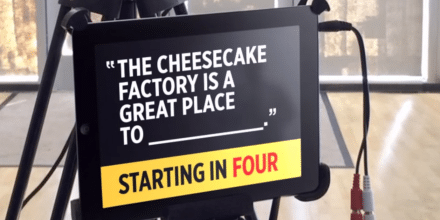A few weeks ago, I had the chance to attend the Great Place To Work conference in Dallas. It’s a terrific event that companies should check out – regardless of whether your organization aspires to be on Fortune’s 100 Best Companies to Work For list. And here’s why:
We’re beginning to see a significant change in the labor market. There are fewer qualified candidates for job openings. Organizations will have to engage their workforce at a high level and compete for talent. Candidates are doing their homework about companies before they apply. They want to know that a company is worth it before applying. This means that having a great corporate culture and promoting a great culture should rank right up there on your priority list.
Now I do understand that all of the conversation happening today about creating a best in class employment brand and building a top notch corporate culture might take this conversation on the verge of becoming corporate buzzwords or clichés. Some companies might feel that building an outstanding culture comes at the price of the bottom-line.
I had the chance to speak with Great Place To Work CEO Michael C. Bush during the conference and he said it’s something the business world needs to have more conversations about – connecting corporate culture with company profits. And Great Place To Work really delivered with their closing keynote, David M. Gordon, president of The Cheesecake Factory.
I didn’t realize that The Cheesecake Factory is a publically traded company. So make no mistake – they need to deliver profits. Their shareholders demand it. But David pointed out, their culture matters. He said they look to hire staff members who have “Cheesecake in their veins” (figuratively, not literally of course). He talked about the importance of nurturing the bodies, minds, hearts and spirits of staff members. He even shared how actions within the organization are labeled, “So Cheesecake!” The point being: The Cheesecake Factory has invested heavily in developing their culture.
David also shared what it meant in terms of results. He said that they could tell the locations that have embraced The Cheesecake Factory culture because staff member engagement was higher at those locations. In addition:
- Attrition was significantly less than average
- Guest satisfaction scores were meaningfully better than average
- Profit goals were attained and exceeded, in most cases
In an industry where the average turnover is 60+ percent, these are impressive outcomes. The Cheesecake Factory is a great example of a company in a highly competitive industry that is realizing success by drawing a connection between their culture and their bottom-line. And we know that the restaurant industry is a very tough industry to work in. It can be known for high-turnover and not always viewed as a long-term career. Places like The Cheesecake Factory are changing that with their investment into culture and employee engagement.
Corporate culture and the bottom-line are not mutually exclusive. In fact, they are intertwined more than ever.
The Cheesecake Factory logo and video are used with permission. The Cheesecake Factory trade name, logo, and trade dress are owned by TCF Co. LLC.
This blog was originally published on HR Bartender.
Sharlyn Lauby is the author of the blog HR Bartender and president of ITM Group Inc.







